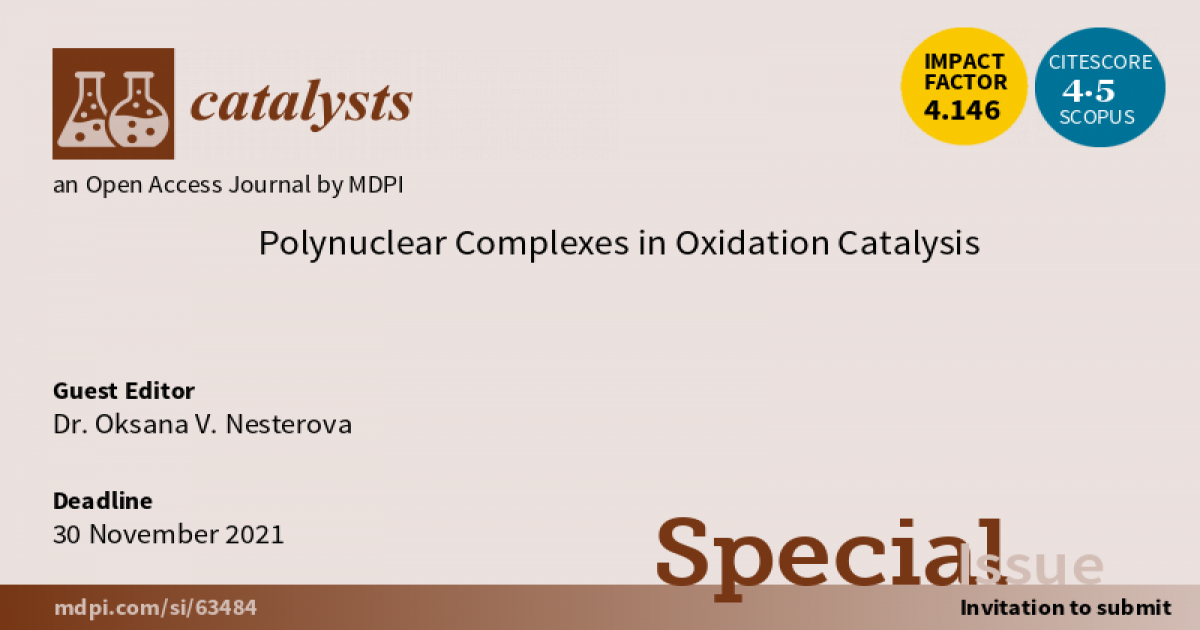- 4.0Impact Factor
- 7.6CiteScore
- 17 daysTime to First Decision
Polynuclear Complexes in Oxidation Catalysis
This special issue belongs to the section “Catalysis in Organic and Polymer Chemistry“.
Special Issue Information
Dear Colleagues,
Catalytic oxidation is a process of fundamental significance in chemistry. From both organic and inorganic points of view, catalytic oxidation is a part of many laboratory and industrial protocols for a wide range of valuable products. Coordination compounds of transition metals are common catalysts for oxidative transformations, where the metal centre plays various roles, from the coordination of substrates and stabilization of intermediates to the activation of an oxidant. Polynuclear complexes, inspired by structures of enzymes’ active centres, could constitute next-generation catalysts. The presence of few metals at a close distance could promote the interaction between coordinated intermediates, enhancing the activity and opening new catalytic pathways.
This Special Issue welcomes contributions focused on investigation of the catalytic activity of polynuclear coordination compounds in a broad range of oxidative processes. This includes both inorganic (e.g., water oxidation) and organic (oxidation of functional groups, late stage functionalization, C–H activation, oxidative coupling, etc.) reactions of fundamental and applied interests.
Dr. Oksana V. Nesterova
Guest Editor
Manuscript Submission Information
Manuscripts should be submitted online at www.mdpi.com by registering and logging in to this website. Once you are registered, click here to go to the submission form. Manuscripts can be submitted until the deadline. All submissions that pass pre-check are peer-reviewed. Accepted papers will be published continuously in the journal (as soon as accepted) and will be listed together on the special issue website. Research articles, review articles as well as short communications are invited. For planned papers, a title and short abstract (about 250 words) can be sent to the Editorial Office for assessment.
Submitted manuscripts should not have been published previously, nor be under consideration for publication elsewhere (except conference proceedings papers). All manuscripts are thoroughly refereed through a single-blind peer-review process. A guide for authors and other relevant information for submission of manuscripts is available on the Instructions for Authors page. Catalysts is an international peer-reviewed open access monthly journal published by MDPI.
Please visit the Instructions for Authors page before submitting a manuscript. The Article Processing Charge (APC) for publication in this open access journal is 2200 CHF (Swiss Francs). Submitted papers should be well formatted and use good English. Authors may use MDPI's English editing service prior to publication or during author revisions.
Keywords
- Polynuclear complexes
- transition metals
- homogeneous catalysis
- oxidation processes
- organic synthesis
- reaction mechanism
- kinetics

Benefits of Publishing in a Special Issue
- Ease of navigation: Grouping papers by topic helps scholars navigate broad scope journals more efficiently.
- Greater discoverability: Special Issues support the reach and impact of scientific research. Articles in Special Issues are more discoverable and cited more frequently.
- Expansion of research network: Special Issues facilitate connections among authors, fostering scientific collaborations.
- External promotion: Articles in Special Issues are often promoted through the journal's social media, increasing their visibility.
- e-Book format: Special Issues with more than 10 articles can be published as dedicated e-books, ensuring wide and rapid dissemination.

